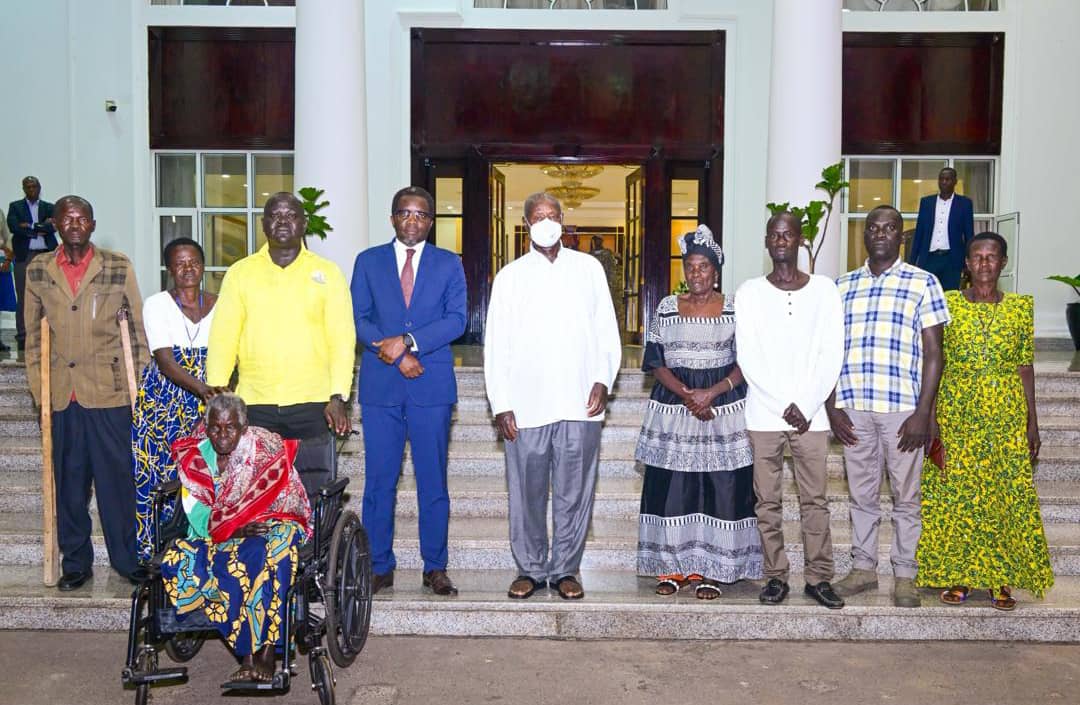Museveni Meets Family of Former Rebel Commander Francis 'Hitler' Eregu

President Museveni has met with the family of the late Francis 'Hitler' Eregu, a once-feared rebel commander who led the Uganda People’s Army (UPA) during the insurgency that rocked Eastern and Northern Uganda from 1986 to 1994.
At State House Entebbe on Thursday, Museveni offered material support and an emotional gesture of reconciliation to the family of the man who once tried to topple his government.
Eregu, killed in a fierce battle with the National Resistance Army (NRA) during the early years of Museveni’s rule, remains a controversial figure in Uganda’s turbulent history.
“If Eregu had been alive, I would have offered him a role to serve this country, just like I have done with others,” Museveni told the family, his voice measured.
“It is unfortunate he died while in the struggle. But in his memory, I will stand with his family.”
The meeting was attended by Eregu’s 102-year-old mother, Angela Aero, his widows Joyce Ajiko, and Aisha Namutebi, and several children and siblings — many of whom have lived in poverty since Eregu’s death.
It marked the first formal recognition by the State of the hardships faced by the family of one of its former enemies.
One of Eregu’s brothers, Selen Ebwangu Enabu, spoke on behalf of the family.
“We’ve been suffering,” he said. “After he died, we were left with nothing, no land, no home, no help. Life has been very hard for us.”
The family’s plight came to light through the efforts of Calvin Echodu, an NRM vice-chairmanship aspirant for Eastern Uganda, who had been quietly supporting the family by constructing a two-room house for Eregu’s elderly mother and providing financial assistance.
Echodu alerted Kenneth Omona, the minister in charge of Northern Uganda, and Augustine Otuko, the President’s Private Secretary for Political Affairs, who coordinated the State House meeting.
Moved by their story, Museveni promised to build a permanent house for the family and rental units for the widows to ensure a steady income.
He also called on the children to organise themselves into a group that the government would fund to start a poultry project.
Among the children was Jude Engulu, 33, a peasant farmer who dropped out of school after Senior Four due to lack of fees.
“I just want to work and make my father proud,” he said, holding back tears. For him and others, the president’s gesture is not just about bricks and money, but about being seen.
President Museveni also committed to supporting the broader clan to which Eregu belonged — an act he described as essential in reconciling with Uganda’s painful past.
“Supporting the family of Eregu is not just charity,” the President said. “It’s a recognition that the past, no matter how painful, must not dictate our future. It’s about building unity from our divisions.”
Eregu Hitler was a central figure in the Uganda People’s Army, a group composed mainly of former soldiers from the Uganda National Liberation Army and local fighters from Teso and Lango sub-regions.
At its peak, the UPA mounted serious military resistance against the NRA, exploiting local discontent over disarmament and political marginalisation in the post-Obote era.
Though the rebellion was eventually crushed, its legacy still casts a shadow over communities that bore the brunt of violence.
By reaching out to the Eregu family, Museveni is not only extending an olive branch but also implicitly acknowledging that the cost of war continues long after the last gunshot.
His message of reconciliation echoed similar efforts seen in recent years, including meetings with former adversaries and the reintegration of other rebel factions.
Observers have described Thursday’s meeting as one of the clearest examples of the President’s attempt to close old wounds in the twilight of his long rule.
“It’s not about politics anymore,” said one aide familiar with the meeting. “It’s about legacy. It’s about peace.”
And for a family that spent decades in obscurity and stigma, the visit to State House has become a turning point — not just a chance for material recovery, but a public validation of their pain, and perhaps, a beginning of healing.
In the end, what stood out was not the memory of Eregu the rebel, but the resilience of the people he left behind — and the possibility that even the most bitter of Uganda’s conflicts can still give birth to reconciliation.



0 Comments